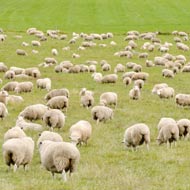
North Wales Police gather daily statistics to tackle rural crime
Police in North Wales say a 'zero tolerance' approach is the only way to deal with sheep worrying. Methods employed by the force are said to have brought about a 'significant' drop in all rural incidents, including sheep attacks.
PC Dave Allen, from the North Wales Police rural crime team (RCT), said taking this tough stance with irresponsible dog owners was "the only answer" and had led to court cases and heavy fines. In one recent case, a dog owner lost an appeal against the euthanasia of both her dogs following an incident in Flintshire.
"It’s sad when dogs have to be destroyed through a court order," he added, "but we have found time and time again that once a dog attacks sheep it will attack again if given the chance."
In order to identify the rural crime issues of real concern, the RCT began gathering daily statistics on a number of different incidents, including sheep worrying.
According to the team, this specially collated data has revealed 'the true extent of dog attacks on sheep in North Wales' and led to 'significant' drops in the number of rural incidents - including sheep attacks.
"At an early stage we identified that this was a problem for our farming communities, with many incidents going unreported and farmers often losing thousands of pounds, which is clearly unacceptable," said PC Allen.
In the past 12 months, the analysis shows there was an average of nine attacks on sheep a month.
In total, 108 separate incidents were recorded, most of which involved more than one sheep. In one instance, more than 30 sheep were attacked by a dog in Buckley.
Gwynedd alone had 27 recorded incidents - the highest number in North Wales and three times that of the Wrexham county, which had 10.
Incidentally, Friday was found to be the most likely day for incidents to occur though it is not clear why.



 The latest
The latest